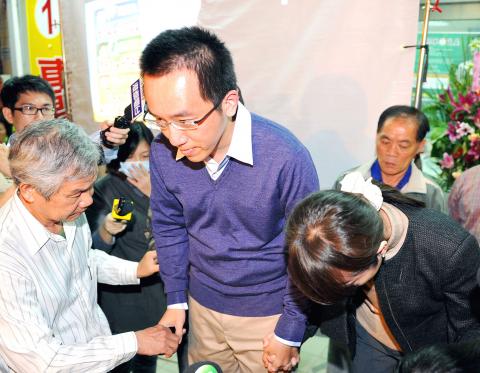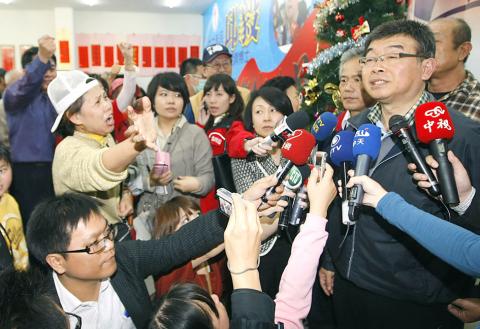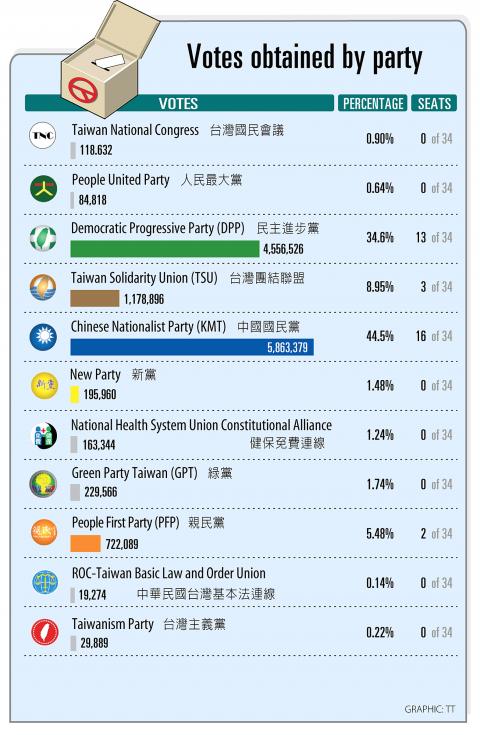The pan-green camp yesterday made substantial gains in the legislature, with the Democratic Progressive Party (DPP) and the Taiwan Solidarity Union (TSU) obtaining more than 43 percent of votes in the legislative election, against a little more than 50 percent for the Chinese Nationalist Party (KMT) and the People First Party (PFP).
The DPP secured more than 4.5 million votes, or 34.6 percent of the vote. The TSU won 1.18 million votes, or 8.95 percent of the vote, while the KMT obtained more than 5.86 million, or 44.55 percent, and the PFP 722,000, or 5.48 percent.
Both the TSU and the PFP made their way back into the legislature by garnering more than 5 percent of the popular vote, a requirement for parties to secure legislator-at-large seats.

Photo: Huang Chih-yuan, Taipei Times
The PFP had a total of 12 candidates competing in the fourth, sixth and eighth districts of Taipei, the first district in New Taipei City (新北市), the seventh and eighth districts in Greater Taichung, the first district in Greater Tainan, in Kinmen County and the third district of Taoyuan County, as well as the mountain area and plains Aboriginal districts.
Some of them were popular legislators, including Lee Ao (李敖) and Liu Wen-hsiung (劉文雄), but almost none were able to gain sufficient votes to come out on top.
The performance of the candidates fielded by the two major parties — the KMT and the DPP — varied.

Photo: CNA
Despite the high publicity that surrounded his campaign, Chen Chih-chung (陳致中), the son of former president Chen Shui-bian (陳水扁), failed in his first bid as an independent candidate. His participation in the ninth district of Greater Kaohsiung is believed to have split the DPP vote and may have cost the DPP’s Kuo Wen-cheng’s (郭玟成) bid for re-election as he lost to KMT Legislator Lin Kuo-cheng (林國正).
Former New Party legislator Joanna Lei (雷倩), the daughter of former Vice Admiral Lei Hsueh-ming (雷學明), who left the KMT in 2007 for the New Party, also failed in her bid as an independent candidate in Zhonghe (中和), New Taipei City.
Former Lienchiang County commissioner Chen Hsueh-sheng (陳雪生), formerly of the PFP, but who ran as an independent, defeated incumbent KMT legislator Tsao Erh-chang (曹爾忠), who was seeking a sixth term in the legislature.

GRAPHIC: TT
Lin Pin-kuen (林炳坤) of the Non-Partisan Solidarity Union and the incumbent legislator for Penghu was defeated by DPP Penghu County councilor Yang Yao (楊曜). Some attributed Lin’s surprising defeat to the fact that the airport in Penghu was closed because of heavy fog, which prevented some people from returning home to vote.
Despite his failure to unseat the KMT’s Alex Fei (費鴻泰), Green Party candidate Pan Han-sheng (潘翰聲) garnered more votes this year, as the DPP and PFP did not field candidates in the seventh district of Taipei.
Former legislator Lo Fu-chu (羅福助), who was running as an independent candidate in the 12th district of New Taipei City and is rumored to have ties to organized crime, trailed the incumbent, KMT Legislator Lee Ching-hua (李慶華) and DPP candidate Shen Fa-hui (沈發惠).
Lo’s son, KMT Legislator Lo Ming-tsai (羅明才), was re-elected in the 11th district of New Taipei City.
Meanwhile, four former Government Information Office ministers also ran in the legislative elections this year, with mixed results.
Su Jun-pin (蘇俊賓), who was running for the KMT in Greater Tainan, failed to unseat DPP Legislator Hsu Tain-tsair (許添財). Johnny Chiang (江啟臣) of the KMT beat his opponent, DPP legislative nominee Kuo Chun-ming (郭俊銘), in Greater Taichung.
DPP candidates Lin Chia-long (林佳龍) and Pasuya Yao (姚文智) both won in Greater Taichung and Taipei respectively. Lin defeated the incumbent, KMT legislator Daniel Hwang (黃義交), while Pasuya Yao defeated Justin Chou (周守訓) of the KMT.
Former government spokesperson Chuang Suo-hang (莊碩漢), meanwhile, failed in his bid to unseat KMT Legislator Lu Chia-chen (盧嘉辰).

Several Chinese Nationalist Party (KMT) officials including Chairman Eric Chu (朱立倫) are to be summoned for questioning and then transferred to prosecutors for holding an illegal assembly in Taipei last night, the Taipei Police said today. Chu and two others hosted an illegal assembly and are to be requested to explain their actions, the Taipei City Police Department's Zhongzheng (中正) First Precinct said, referring to a protest held after Huang Lu Chin-ju (黃呂錦茹), KMT Taipei's chapter director, and several other KMT staffers were questioned for alleged signature forgery in recall petitions against Democratic Progressive Party (DPP) legislators. Taipei prosecutors had filed

Taiwan would welcome the return of Honduras as a diplomatic ally if its next president decides to make such a move, Minister of Foreign Affairs Lin Chia-lung (林佳龍) said yesterday. “Of course, we would welcome Honduras if they want to restore diplomatic ties with Taiwan after their elections,” Lin said at a meeting of the legislature’s Foreign Affairs and National Defense Committee, when asked to comment on statements made by two of the three Honduran presidential candidates during the presidential campaign in the Central American country. Taiwan is paying close attention to the region as a whole in the wake of a

NEW WORLD: Taiwan is pursuing innovative approaches to international relations through economics, trade and values-based diplomacy, the foreign minister said Taiwan would implement a “three-chain strategy” that promotes democratic values in response to US tariffs, Minister of Foreign Affairs Lin Chia-lung (林佳龍) said. Taiwan would aim to create a “global democratic value chain,” seek to capitalize on its position within the first island chain and promote a “non-red supply chain,” Lin was quoted as saying in the ministry’s written report to the Legislative Yuan submitted ahead of the legislature’s Foreign Affairs and National Defense Committee meeting slated for today. The Ministry would also uphold a spirit of mutual beneficial collaboration, maintaining close communication and consultations with Washington to show that Taiwan-US cooperation

Taiwan and the US have begun trade negotiations over tariffs imposed by US President Donald Trump earlier this month, Minister of Foreign Affairs Lin Chia-lung (林佳龍) said in an interview this morning before reporting to the Legislative Yuan’s Foreign Affairs and National Defense Committee. The Taipei Economic and Cultural Representative Office (TECRO), Taiwan’s de facto embassy in the US, has already established communication channels with the US Department of State and the US Trade Representative (USTR), and is engaging in intensive consultations, he said. Points of negotiation include tariffs, non-tariff trade barriers and issues related to investment, procurement and export controls, he